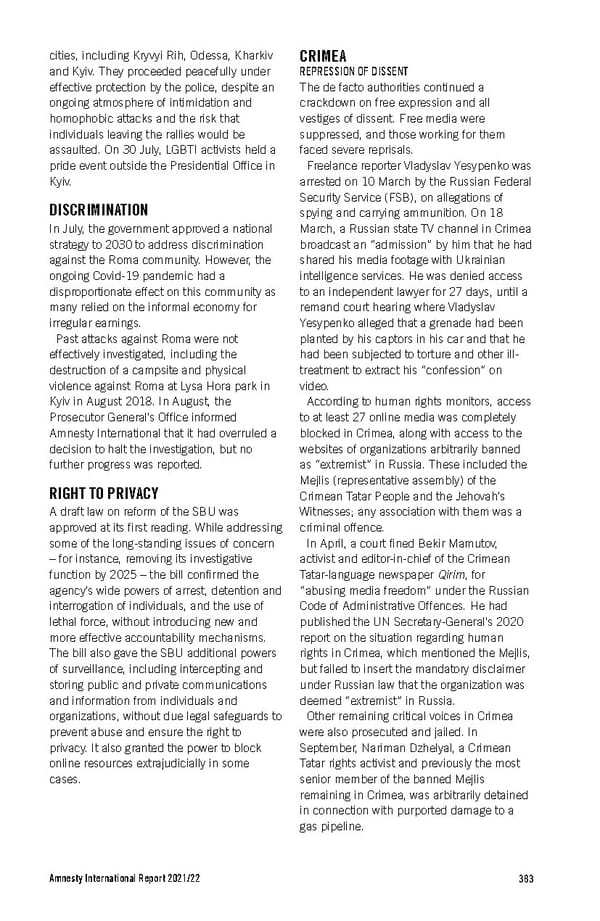cities, including Kryvyi Rih, Odessa, Kharkiv CRIMEA and Kyiv. They proceeded peacefully under REPRESSION OF DISSENT effective protection by the police, despite an The de facto authorities continued a ongoing atmosphere of intimidation and crackdown on free expression and all homophobic attacks and the risk that vestiges of dissent. Free media were individuals leaving the rallies would be suppressed, and those working for them assaulted. On 30 July, LGBTI activists held a faced severe reprisals. pride event outside the Presidential Office in Freelance reporter Vladyslav Yesypenko was Kyiv. arrested on 10 March by the Russian Federal DISCRIMINATION Security Service (FSB), on allegations of spying and carrying ammunition. On 18 In July, the government approved a national March, a Russian state TV channel in Crimea strategy to 2030 to address discrimination broadcast an “admission” by him that he had against the Roma community. However, the shared his media footage with Ukrainian ongoing Covid-19 pandemic had a intelligence services. He was denied access disproportionate effect on this community as to an independent lawyer for 27 days, until a many relied on the informal economy for remand court hearing where Vladyslav irregular earnings. Yesypenko alleged that a grenade had been Past attacks against Roma were not planted by his captors in his car and that he effectively investigated, including the had been subjected to torture and other ill- destruction of a campsite and physical treatment to extract his “confession” on violence against Roma at Lysa Hora park in video. Kyiv in August 2018. In August, the According to human rights monitors, access Prosecutor General’s Office informed to at least 27 online media was completely Amnesty International that it had overruled a blocked in Crimea, along with access to the decision to halt the investigation, but no websites of organizations arbitrarily banned further progress was reported. as “extremist” in Russia. These included the RIGHT TO PRIVACY Mejlis (representative assembly) of the Crimean Tatar People and the Jehovah’s A draft law on reform of the SBU was Witnesses; any association with them was a approved at its first reading. While addressing criminal offence. some of the long-standing issues of concern In April, a court fined Bekir Mamutov, – for instance, removing its investigative activist and editor-in-chief of the Crimean function by 2025 – the bill confirmed the Tatar-language newspaper Qirim, for agency’s wide powers of arrest, detention and “abusing media freedom” under the Russian interrogation of individuals, and the use of Code of Administrative Offences. He had lethal force, without introducing new and published the UN Secretary-General’s 2020 more effective accountability mechanisms. report on the situation regarding human The bill also gave the SBU additional powers rights in Crimea, which mentioned the Mejlis, of surveillance, including intercepting and but failed to insert the mandatory disclaimer storing public and private communications under Russian law that the organization was and information from individuals and deemed “extremist” in Russia. organizations, without due legal safeguards to Other remaining critical voices in Crimea prevent abuse and ensure the right to were also prosecuted and jailed. In privacy. It also granted the power to block September, Nariman Dzhelyal, a Crimean online resources extrajudicially in some Tatar rights activist and previously the most cases. senior member of the banned Mejlis remaining in Crimea, was arbitrarily detained in connection with purported damage to a gas pipeline. Amnesty International Report 2021/22 383
 Amnesty International Report 2021/22 Page 382 Page 384
Amnesty International Report 2021/22 Page 382 Page 384